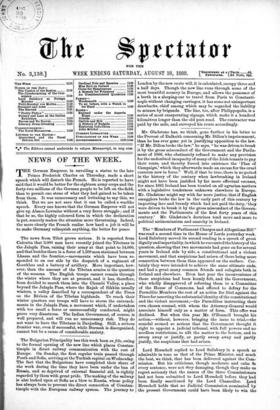Mr. Gladstone has, we think, gone further in his letter
to the Provost of Dalkeith concerning Mr. Dillon's imprisonment, than he has ever gone yet in justifying opposition to the law. "If Mr. Dillon broke the law," he says, "he was driven to break it by the gross misconduct of the Government and the Parlia- ment of 1886, who obstinately refused to make any provision for the undoubted incapacity of many of the Irish tenants to pay their rents, and thereby forced into existence the Plan of Campaign,' which they afterwards made an excuse for the cruel coercion now in force." Well, if that be true, there is no period in the history of the century when lawbreaking in Ireland might not have been justified by far more effectual excuses, for since 1881 Ireland has been treated on all agrarian matters with a legislative tenderness unknown elsewhere in Europe. Mr. Gladstone might say with far more justice, that if English smugglers broke the law in the- early part of this century by importing lace and brandy which had not paid the duty,' they were driven to break it by the gross misconduct of the Govern- ments and the Parliaments of the first forty years of this century.' Mr. Gladstone's doctrines tend more and more to political antinomianism and anarchy in Ireland.


































